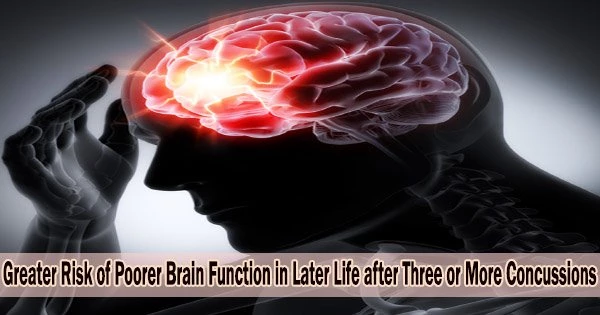Multiple concussions have been associated with decreased brain function and increased risk of neurological problems in later life. This is why it is important for individuals who have experienced multiple concussions to seek medical attention and take steps to prevent further head injuries.
According to important new research, having three or more concussions is associated with decreased brain function in later life. One moderate-to-severe concussion, or traumatic brain injury (TBI), can have a long-term effect on brain function, including memory, according to the largest study of its kind.
Led by teams at the University of Oxford and the University of Exeter, the research included data from more than 15,000 participants of the online PROTECT study, who were aged between 50 and 90 and based in the UK. They filled out yearly, computerized examinations for brain function and disclosed the severity and frequency of concussions they had sustained throughout their lifetimes.
The study, which was published in the Journal of Neurotrauma, discovered that those who reported three or more concussions had considerably lower cognitive performance, which continued to decline with each additional concussion.
Attention and completion of complex tasks were particularly affected. According to researchers, those who have suffered concussions should be cautioned about the risks of continuing high-risk jobs or sports.
Lead investigator Dr. Vanessa Raymont, from the University of Oxford, said: “We know that head injuries are a major risk factor for dementia, and this large-scale study gives the greatest detail to date on a stark finding the more times you injure your brain in life, the worse your brain function could be as you age.”
“Our research indicates that people who have experienced three or more even mild episodes of concussion should be counselled on whether to continue high-risk activities. We should also encourage organisations operating in areas where head impact is more likely to consider how they can protect their athletes or employees.”
Studies like this are so important in unravelling the long-term risks of traumatic brain injury, including their effect on dementia risk. These findings should send a clear message to policy makers and sporting bodies, who need to put robust guidelines in place that reduce risk of head injury as much as possible.
Dr. Susan Kohlhaas
Researchers discovered that subjects with three or more bouts of even moderate concussion had considerably lower attention and cognitive function. The working memory and processing speed of those who had four or more mild concussion episodes also declined. Each additional reported concussion was linked to progressively worse cognitive function.
The researchers also discovered that failing to report even a single moderate-to-severe concussion was linked to deteriorated attention, difficulty finishing complicated activities, and processing speed capability.
In the online PROTECT study, participants share detailed lifestyle information, and complete a suite of cognitive tests every year, for up to 25 years. Researchers can better comprehend the aging process of the brain and the elements that contribute to keeping a healthy brain in old age thanks to this wealth of data.
Dr. Helen Brooker, a study co-author from the University of Exeter, said: “As our population ages, we urgently need new ways to empower people to live healthier lives in later life. This paper highlights the importance of detailed long-term studies like PROTECT in better understating head injuries and the impact to long-term cognitive function, particularly as concussion has also been linked to dementia.”
“We’re learning that life events that might seem insignificant, life experiencing a mild concussion, can have an impact on the brain. Our findings indicate that cognitive rehabilitation should focus on key functions such as attention and completion of complex tasks, which we found to be susceptible to long-term damage.”
Dr. Susan Kohlhaas, Director of Research at Alzheimer’s Research UK, said: “Studies like this are so important in unravelling the long-term risks of traumatic brain injury, including their effect on dementia risk. These findings should send a clear message to policy makers and sporting bodies, who need to put robust guidelines in place that reduce risk of head injury as much as possible.”
The research included collaboration with the University of New South Wales, Australia, Kings College London and University College London, UK, Stavanger University Hospital in Norway, and Harvard Medical School, in the US. The. paper is entitled ‘Lifetime TBI and cognitive domain deficits in late life: The PROTECT-TBI cohort study’, published in the Journal of Neurotrauma.





